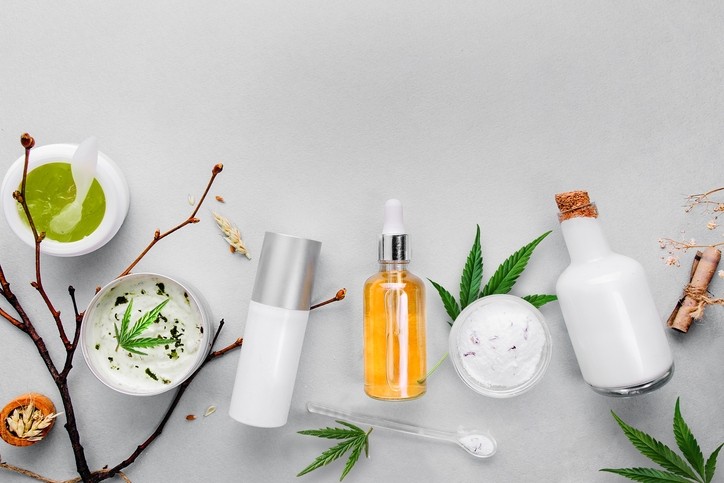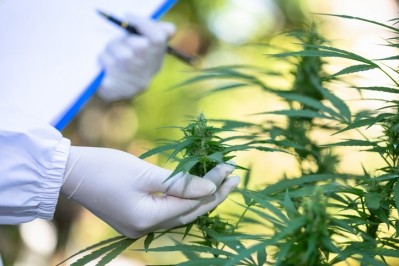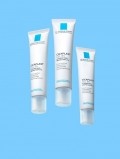Special Edition: CANNABIS BEAUTY – INNOVATION AND SCIENCE IN CBD AND CANNABINOIDS
Cannabis beauty: CBD is ‘an exciting area for innovation’, says expert

Rising interest in CBD and active cannabinoids in beauty continues to dominate the landscape, particularly in skincare. But with ongoing claims confusion, complex regulatory hurdles and a lack of consumer confidence due to greenwashing, what's next for the cannabis beauty trend?
“CBD is an exciting area for innovation where new cosmetic uses are proven or further established with clinical efficacy,” said Belinda Carli, director and cosmetic chemist at the Institute of Personal Care Science.
And with many brands eager to “get to market with any trending innovation”, it made for plenty of interest and activity in the space, Carli told CosmeticsDesign-Europe.
Cannabis and beauty: An effective pairing?
Scientific advancements, innovative extracts and blends of cannabidiol (CBD), along with the increase in retail engagement were all set to positively impact the adoption and popularity of cannabis beauty in 2021, she said.
Speaking on its increasing emergence in beauty and personal care products, Carli noted: "From the clinical efficacy data I have seen, there are definitely cosmetic/skin benefits from the use of CBD. It also appears to be safe when present in amounts that are naturally occurring from hemp seed oil.”
There was some evidence, for example, to show that CBD had anti-inflammatory benefits for the skin which translated to a lot of benefits in personal care, from soothing and moisturising products for sensitive skin to reducing redness and even anti-ageing or skin smoothing benefits, she said.
“CBD has also been shown to control excess sebum secretion and control acne, both through sebum control and anti-inflammatory benefits,” Carli added.
And as science advanced, she said cannabis beauty was amassing “a lot of interesting product launches”.
Hemp butters with standardised CBD content from brands like Hallstar; active ingredients made from cannabis plant stem cells targeting the microbiota, like Kannabia Sense from Vytrus Biotech; and water-soluble, encapsulated CBD from Mibelle Biochemistry were just a few examples, she said.
Importantly, Carli said that alongside all this, there was certainly consumer intrigue and interest. “I believe there is significant consumer appeal because of its THC containing counterpart, and the scientifically proven benefits of medicinally approved cannabis. There are some who are incredibly passionate about the benefits of cannabis for medicinal uses and this raises awareness for hemp and CBD in general.”
So, how could manufacturers and beauty brands successfully navigate the space, appeal to interested consumers and remain exciting?
Global CBD Beauty Regulations
Emphasising that the current regulatory landscape was precisely that - 'current' - Carli outlined what present regulations in relation to CBD stipulated:
- EU (European Union) – CBD that is derived from hemp seed oil or synthetically produced is allowed, but it is important to note that different member states may have their own specific rules that may differ from this.
- ASEAN (The Association of Southeast Asian Nations) regions – follow EU regulations in general (as above), but different member countries may also have other regulations that may supersede this for CBD specifically.
- Australia – CBD is permitted when it is from hemp seed oil and the CBD is less than or equal to 50mg/kg (0.005%w/w) and THC ((tetrahydrocannabinol) — which, along with CBD, is the primary active ingredient of cannabis — is less than or equal to 20mg/kg (0.002%w/w).
- New Zealand – CBD is banned, but hemp oil is okay (with no CBD).
- US – CBD is okay in states where marijuana is legalised for recreational use but may or may not be permitted in other states. Checks with local regulations are advised as CBD may be permitted from hemp oil where it is naturally occurring but may not be permitted at all depending on where the product is to be sold.
- Canada – CBD is banned, but hemp oil is okay (with no CBD).
‘Tread carefully’ when entering the cannabis beauty space
First and foremost, brands had to examine the regulatory requirements when exploring possible NPD innovation and routes to market, said Carli, considering country-specific regulations where that product would be sold.
Regulations, by their very nature, referred to the ongoing process of monitoring and applying laws, and so brands had to be aware the emphasis was certainly placed on the word ‘current’. “It could change at any moment”, said Carli.
“It is important to remember that for a lot of countries, these rules are still being determined or may be changed to ensure consumer protection as we continue to find out more about the benefits and potential safety issues of CBD,” she said.
Any brands working in the field of cannabis beauty had to “tread carefully”, she said. “At best, consider this area in flux and any developments a company wants to make could be subject to changing regulations in this area.”
It was also important to note that there were complex regulations and variations around the world, she said.
“There is real opportunity for a range of products—and consumers—to benefit from the use of CBD in personal care products, if regulations allow it,” said Carli.
Labelling and marketing claims have ‘very clear’ regulations
On the marketing claims and on-pack labelling side, she said the regulators were “very clear”.
“Regardless of whether CBD is or is not permitted, regulators are very quick to inform cosmetic companies that claims made must comply with cosmetic regulations and not imply medicinal benefits such as being able to treat, mitigate or prevent disease,” Carli said.
Therefore, for brands conceptualising their marketing campaigns or considering entering the space, accuracy over a product’s actual benefits and content was crucial, she said.
“Products must not be marketed in a way that would be confusing to a consumer about CBD or THC content and the benefits beyond cosmetic application.”
Touching upon the notion that a trend’s debatability contributed to its popularity, Carli concluded: “When it is as hotly debated as CBD, it makes it even more exciting to bring out a product with proof behind its benefits — just make sure you check those regulations carefully as compliance is a minefield!”
![Vitality CBD has a wide range of cannabidiol oils and edibles and extensive range of beauty and personal care products [Image: Vitality CBD]](/var/wrbm_gb_food_pharma/storage/images/_aliases/wrbm_medium/publications/cosmetics/cosmeticsdesign-europe.com/article/2021/08/23/yooma-wellness-acquires-vitality-cbd-edging-it-into-cannabis-beauty-space-further/12757697-1-eng-GB/Yooma-Wellness-acquires-Vitality-CBD-edging-it-into-cannabis-beauty-space-further.jpg)
![The personal care major says the antiperspirant formulas have demonstrated anti-irritation skin benefits when used in multiple forms, including roll-on, stick and spray [Getty Images]](/var/wrbm_gb_food_pharma/storage/images/_aliases/wrbm_medium/publications/cosmetics/cosmeticsdesign-europe.com/headlines/formulation-science/colgate-patents-cbd-antiperspirant-deodorants-skin-care-and-hair-care-formulas-for-anti-irritant-properties/12555126-1-eng-GB/Colgate-patents-CBD-antiperspirant-deodorants-skin-care-and-hair-care-formulas-for-anti-irritant-properties.jpg)
![Asia Horizon has suggested a few ‘straightforward’ ways China can go about regulating CBD cosmetics. [Getty Images]](/var/wrbm_gb_food_pharma/storage/images/_aliases/wrbm_medium/publications/cosmetics/cosmeticsdesign-asia.com/headlines/regulation-safety/china-cbd-ban-asia-horizon-ceo-suggests-how-china-can-better-regulate-cbd-cosmetics-market/12350040-1-eng-GB/China-CBD-ban-Asia-Horizon-CEO-suggests-how-China-can-better-regulate-CBD-cosmetics-market.jpg)

















